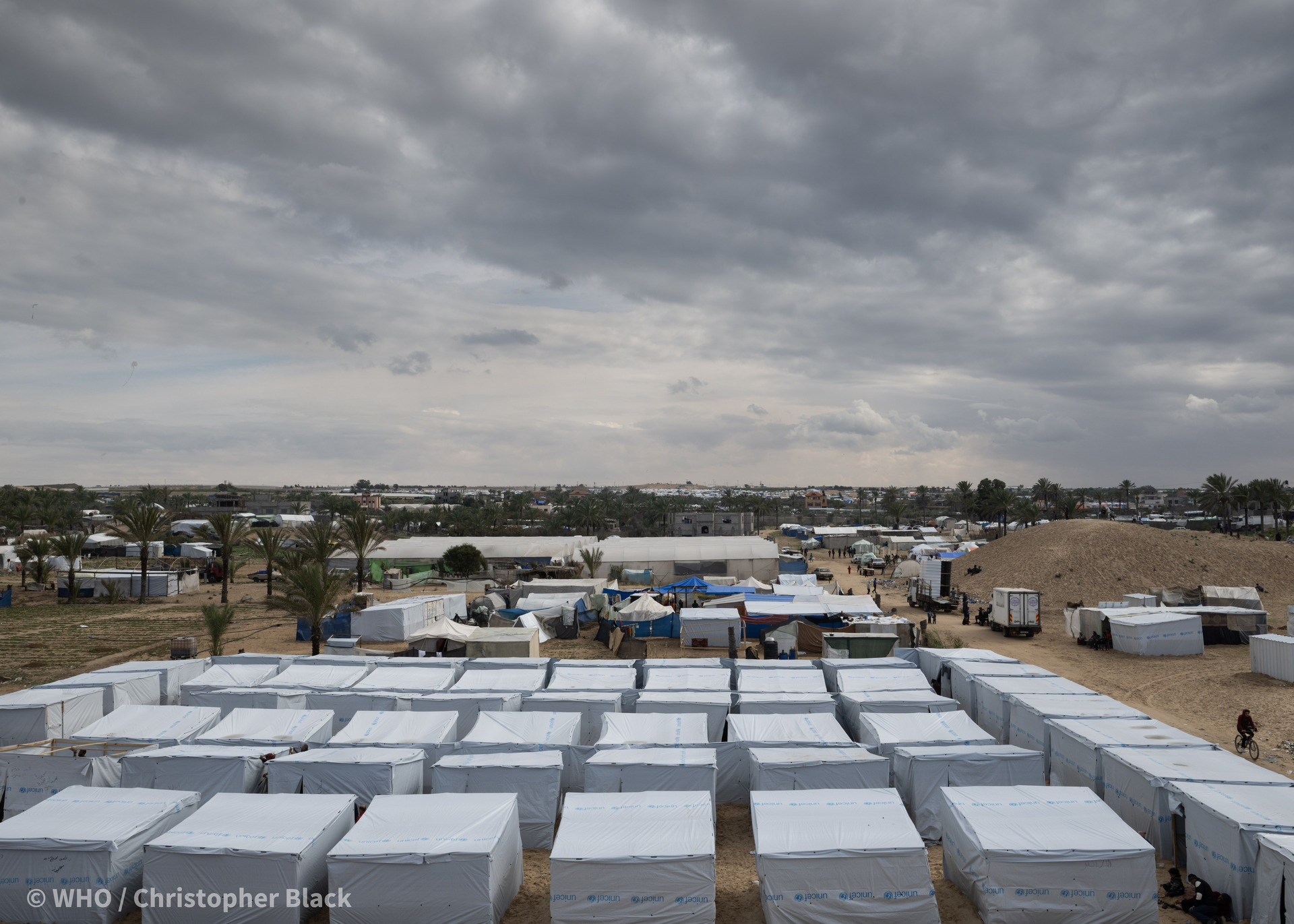
Overhead view of a camp for displaced persons, Al Mawasi neighbourhood, Rafah on February 18, 2024. Photo Credit: WHO / Christopher Black
Jerusalem/Cairo/Geneva/Washington/Tel Aviv: Any military incursion by Israel will substantially increase mortality and morbidity and further weaken an already broken health system in Rafah in the Gaza Strip. More than 1.2 million people are currently sheltering in the area, many unable to move anywhere else. A new wave of displacement would exacerbate overcrowding, further limiting access to food, water, health and sanitation services, leading to increased disease outbreaks, worsening levels of hunger, and additional loss of lives.
Israel’s Prime Minister Benjamin Netanyahu reemphasised on May 2, 2024, that “We will do whatever is necessary to win and overcome our enemies, including in Rafah”, and the United States while reiterating that it did not believe a major military operation Rafah would be in Israel’s long-term security interests, again blamed the Hamas for “holding up reaching an immediate ceasefire that would help alleviate the suffering of the Palestinian people in Gaza”.
The World Health Organization (WHO) today stated it is “deeply concerned” that a full-scale military operation in Rafah could lead to a bloodbath.
Only 33% of Gaza’s 36 hospitals and 30% of primary health care centres are functional in some capacity amid repeated attacks and shortages of vital medical supplies, fuel, and staff. WHO warned that the broken health system there would not be able to cope with a surge in casualties and deaths that a Rafah incursion would cause.
The three hospitals (Al-Najjar, Al-Helal Al-Emarati and Kuwait hospitals) currently partially operational in Rafah will become unsafe to be reached by patients, staff, ambulance, and humanitarians when hostilities intensify in their vicinity and, as a result quickly become nonfunctional, WHO said.
The European Gaza Hospital in east Khan Younis, which is currently functioning as the third-level referral hospital for critical patients, is also vulnerable as it could become isolated and unreachable during the incursion. Given this, the south will be left with six field hospitals and Al-Aqsa Hospital in the Middle Area, serving as the only referral hospital.
As part of ongoing contingency efforts, WHO, partners and hospital staff have completed the first phase of the restoration of Nasser Medical Complex, including cleaning and ensuring essential equipment is functioning. The emergency ward, nine operating theatres, intensive care unit, maternity ward, neonatal intensive care unit and the outpatient department are now partly functional, and national staff alongside emergency medical teams are working there.
To alleviate the burden on hospitals, WHO and partners said they are establishing additional primary health centres and medical points in Khan Younis, Middle Area, and northern Gaza as well as pre-positioning medical supplies to enable these facilities to detect and treat communicable and non-communicable diseases and manage wounds. A new field hospital is being set up in Al Mawasi in Rafah.
A large WHO warehouse has been established in Deir al Bala and a sizable volume of medical supplies has been shifted there from WHO warehouses in Rafah as they could become unreachable during the incursion. These measures will help to ensure the rapid movement of supplies to Khan Younis, Middle Area and northern Gaza when needed.
In the north, WHO and partners are scaling up efforts to resupply and expand services at Kamal Adwan, Al-Ahli, and Al-Awda hospitals, along with supporting the transfer of very ill patients to hospitals where they can get the treatment they need to survive. Plans are also underway to support the restoration of Patients’ Friendly Hospital, focusing on pediatric services.
Despite the contingency plans and efforts, WHO warned today that substantial additional mortality and morbidity is expected when the military incursion takes place and called for an immediate and lasting ceasefire and the removal of the obstacles to the delivery of urgent humanitarian assistance into and across Gaza, at the scale that is required.
WHO additionally called for the sanctity of health care to be respected. “Parties to the conflict have the coordinates of health facilities: it is imperative they are actively protected and remain accessible to patients, health workers and partners. The safety of health and humanitarian workers must be guaranteed. Those striving to save lives should not have to endanger their own,” it stated.
– global bihari bureau




